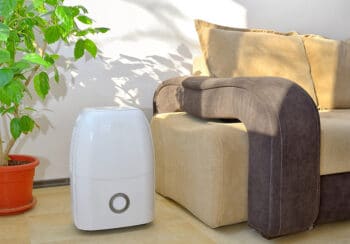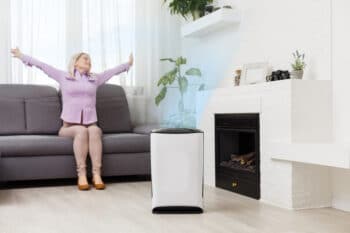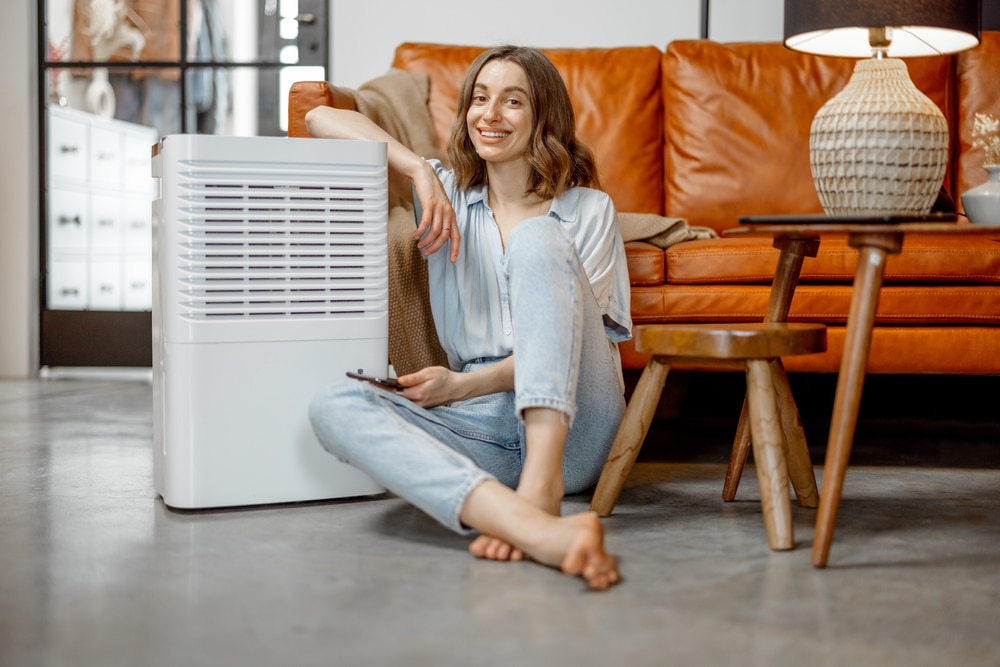Last Updated on January 10, 2023
Staying healthy isn’t always easy, but a dehumidifier can provide some health benefits that you can experience almost immediately in your household. Let’s take a look at some of the exciting positives of a dehumidifier.
There are many advantages of a dehumidifier in homes but let us explore exactly what does a dehumidifier do for your health?
Can Prevent Asthma Attacks
Using a home dehumidifier can prevent asthma attacks from happening as children won’t become exposed to mould or encounter respiratory problems into their teenage years, which can then later cause problems.
These types of attacks are often formed by exposure to mould dust mites, irritation to central heating, or sometimes compounds found in cleaning products or carpets and furniture. You can check the ingredients of every product and item you bring into your home, but this won’t always eliminate attacks. Fortunately, using a dehumidifier can massively reduce the common triggers, such as mould or dust mites. Dehumidifiers work by capturing these irritating particles from your home and preventing them from becoming exposed to your environment.
Remove Dampness

Dampness can happen in any home, especially during winter, when you have the windows shut and the central heating. When your home becomes infested with damp, it can lead to mould and even rust. It doesn’t just look discouraging, but it can also mark ceiling fans and books that react to the high humidity levels in your home.
If you use a dehumidifier, it’ll keep your home dry and remove moisture levels. So instead of wiping off mould from the walls every few days, a dehumidifier can prevent it from forming in the first place.
Reduce Condensation
You need a dehumidifier in your home if you’re experiencing a lot of condensation. It happens when the air hits a cold surface and is affected by a lot of moisture in the air. Therefore, the main solution for this is to ventilate the air in your home to eliminate any warm dampness. You can achieve this at home by switching on the heating and then opening the windows, although this can seem like a waste of money and energy. Plus, you’ll experience the cold air from the window being open.
Another way to reduce condensation and the humidity level indoors is by using a dehumidifier. It is a much simpler and cost-effective process. Also, it removes dampness from your home, resulting in a warmer and dryer environment.
You should also bear in mind that condensation can cause mould, so it’s great to get into good habits now before that starts happening.
Purifies the Air
Clean air is essential for your health, and a dehumidifier can make the air you breathe more comfortable and prevent health issues from forming. There are many dehumidifiers with built-in air purifiers that improve air circulation and provide cleaner air in your home.
Helps With Skin Conditions
These appliances can help with skin side effects, such as eczema, dryness, and pigmentation. It is primarily because many of these skin conditions come from allergens in the air that can trigger itching, infection, and inflammation. In particular, eczema occurs when moisture in the skin leaks out, revealing dry and cracked skin. It can also make the skin more welcoming to irritants and allergens. Keeping your home humidity level below 70% can help with these skin issues.
Helps With Respiratory Problems

If you have a respiratory illness, a dehumidifier can help with difficulty breathing or a sensation of a heavy chest feeling. Other signs of respiratory problems can include weakness, palpitations, and fevers.
Although there are many treatments for respiratory diseases, a dehumidifier can purify the air, prevent mildew from forming, and more. Fortunately, these appliances can make breathing a little easier and soothe any throat or lung issues. Plus, dehumidifiers can reduce triggers and prevent hyperventilation attacks from happening while keeping the air at a comfortable temperature in your home.
Improves Your Immune System
Preventing is better than cure, and it’s best to have a strong immune system from the beginning than to search for solutions to problems afterwards. Since your body is responsible for adding protection and preventing diseases from forming, it’s weakened when you’re exposed to bacteria and allergens. Fortunately, a dehumidifier can help with humidity levels, dust mites, and reducing bacteria. Many of these allergens are airborne, and a dehumidifier can help remove them, positively impacting your health.
Keeps Food Fresher For Longer
A dehumidifier can keep food fresh and prevent them from going bad or developing mould. It includes food such as cake mix, powder, cereals, and bread. When these foods dry out, they can become crumbly and cracked, making them flavourless and even inedible. Using a dehumidifier in the kitchen area can prolong the shelf life of dry foods. Removing excess moisture in your living space can regulate humidity levels, preventing mould from forming on various surfaces and packages.
Stops Rust From Forming
Tools, electronics, and equipment around the house can become rusty if the air becomes too humid. Not only can this affect the appearance of everyday items, but it can stop them from working. Using a dehumidifier in popular areas of your home can remove excess moisture from the air and prevent a build-up of rust. It doesn’t just affect tools, keys, and more, but it can also impact door frames and hinges. Dehumidifiers can prevent any problems from arising in the first place.
Removes Musty Smells
Homes can develop a musty smell due to the growth of mould and mildew. This development of fungi can release nasty gases that are absorbed into walls, furniture, and fabrics. As a result, this can create a musty smell that laundry rooms can’t always combat as you would think.
In addition, a spray or candle isn’t always enough to remove musty smells. Therefore it’s best to opt for a dehumidifier that can get rid of these smells in the first place.
https://twitter.com/belugachop/status/1373113445126656003
Dehumidifier vs Air Purifier
There might be some confusion over the difference between a dehumidifier and an air purifier. The main difference between these two units is that an air purifier removes harmful pollutants from the room, including bacteria, dust, dander, and more. On the other hand, dehumidifiers remove excess moisture from your home, keeping the moisture level balanced.
How Often Should You Use a Dehumidifier?
There’s no one set answer to using a dehumidifier, as it all depends on your home size, climate, and things you use at home. In particular, running a dehumidifier for around 12 hours a day can help with allergy symptoms, health problems, and more. This amount of time every day will help with controlling humidity levels at home without increasing energy bills.
Tips to Get the Most Out of Dehumidifiers
A dehumidifier can only be as effective as the way it’s treated. Below are some useful tips for reaping all the benefits of a dehumidifier.
Remove Water From the Dehumidifier Often
It’s important to remove water from the dehumidifier after each use or if you move it to another room. Doing so will help to make it run more effectively and efficiently.
Consider the Dehumidifier’s Position
Don’t store dehumidifiers near a wall, curtains, or furniture (keep it at least six inches away from the wall). It’s also important to keep the doors closed during use, and you may want to keep them away from the window, too. Instead, position it centrally in the room to encourage removing air moisture more efficiently. The more central it’s positioned, the more moisture it’ll remove.
Moreover, keep the dehumidifier on a flat surface where it’s positioned safely to allow it to work efficiently and remove any obstructions from the air filter’s path.
Use It at Efficient Times
Moreover, don’t use your dehumidifiers at just any time, but consider when it’ll be most effective for improving humidity levels in your home. Power yours up after you’ve taken a shower/bath or if you’ve just washed laundry. You can also use it before going to bed to help with humidity when you sleep.
Remove Dust Particles by Cleaning Your Home First
Clean your home with the vacuum and polish before switching on the dehumidifier. Doing so will help prevent dust particles from spreading in your home, which is ideal for preventing allergies from developing. Plus, you can use a low humidity setting to control dust mites.
Set the Humidity Levels
Set the humidity levels to 30–50 percent or around 40 percent when it’s colder outside. If you keep the levels any higher than that, it can reduce its effectiveness of decreasing mildew, mould, and dust mites.
Take Care of Your Health
After reading some of the advantages of a dehumidifier and learning what does a dehumidifier do for your health, would you consider owning one and using one in your household?
Let us know your thoughts, along with any additional benefits that you know, in the comments.
Amy is a U.K.-based writer and editor with a penchant for helping consumers find the best home products for their needs, as well as providing easily digestible guides for living better at home. Her dedication to her work means she can usually be found elbow-deep in research or hunting down samples of the latest and greatest on behalf of her readers.
An avid DIYer herself, Amy’s passion lies in teaching others how they too can achieve their dream homes by tackling some of those pesky projects themselves! Whether it’s building furniture from scratch or turning an old dresser into a coffee table, Amy is always happy to share what she knows about making your house feel like home without spending a fortune.

